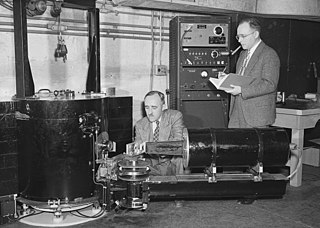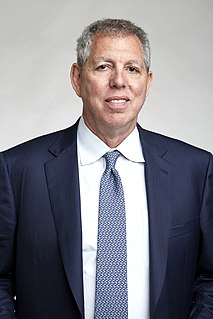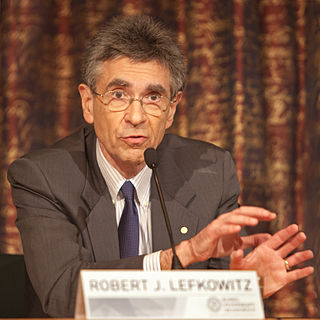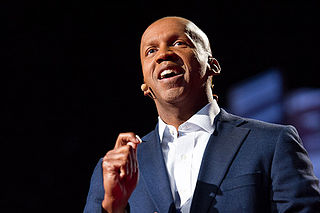
The National Academy of Sciences (NAS) is a United States nonprofit, non-governmental organization. NAS is part of the National Academies of Sciences, Engineering, and Medicine, along with the National Academy of Engineering (NAE) and the National Academy of Medicine (NAM).

The British Academy is the United Kingdom's national academy for the humanities and the social sciences. It was established in 1902 and received its royal charter in the same year. It is now a fellowship of more than 1,000 leading scholars spanning all disciplines across the humanities and social sciences and a funding body for research projects across the United Kingdom. The academy is a self-governing and independent registered charity, based at 10–11 Carlton House Terrace in London.

Clifford Glenwood Shull was a Nobel Prize-winning American physicist.

David John Stevenson is a professor of planetary science at Caltech. Originally from New Zealand, he received his Ph.D. from Cornell University in physics, where he proposed a model for the interior of Jupiter. He is well known for applying fluid mechanics and magnetohydrodynamics to understand the internal structure and evolution of planets and moons.

Janet Davison Rowley was an American human geneticist and the first scientist to identify a chromosomal translocation as the cause of leukemia and other cancers. This proved that cancer is a genetic disease. Rowley spent majority of her life working in Chicago and received many awards and honors throughout her life, recognizing her achievements and contributions in the area of genetics.
Donald Metcalf AC FRS FAA was an Australian medical researcher who spent most of his career at the Walter and Eliza Hall Institute of Medical Research in Melbourne. In 1954 he received the Carden Fellowship from the Anti-Cancer Council of Victoria; while he officially retired in 1996, he continued working and held his fellowship until his death in December 2014.

The New York Academy of Sciences was founded in January 1817. It is one of the oldest scientific societies in the United States. An independent, nonprofit organization with more than 20,000 members in 100 countries, the academy's mission is "to advance scientific research and knowledge; to support scientific literacy; and to promote the resolution of society's global challenges through science-based solutions". The incoming president and CEO is Nicholas Dirks; the current chair of the board of governors of the academy is NYU professor and longtime senior vice president of all research for IBM, Paul Horn. He succeeds Nancy Zimpher, Chancellor, The State University of New York (SUNY).

Jeffrey M. Friedman is a molecular geneticist at New York City's Rockefeller University and an Investigator of the Howard Hughes Medical Institute. His discovery of the hormone leptin and its role in regulating body weight has had a major role in the area of human obesity. Friedman is a physician scientist studying the genetic mechanisms that regulate body weight. His research on various aspects of obesity received national attention in late 1994, when it was announced that he and his colleagues had isolated the mouse ob gene and its human homologue. They subsequently found that injections of the encoded protein, leptin, decreases body weight of mice by reducing food intake and increasing energy expenditure. Current research is aimed at understanding the genetic basis of obesity in human and the mechanisms by which leptin transmits its weight-reducing signal.

Robert Joseph Lefkowitz is an American physician and biochemist. He is best known for his groundbreaking discoveries that reveal the inner workings of an important family G protein-coupled receptors, for which he was awarded the 2012 Nobel Prize for Chemistry with Brian Kobilka. He is currently an Investigator with the Howard Hughes Medical Institute as well as a James B. Duke Professor of Medicine and Professor of Biochemistry and Chemistry at Duke University.

The Kavli Prize was established in 2005 through a joint venture between the Norwegian Academy of Science and Letters, the Norwegian Ministry of Education and Research, and The Kavli Foundation. The main objective for the Prize is to honor, support and recognize scientists for outstanding scientific work in the fields of astrophysics, nanoscience and neuroscience and award three international prizes every second year. The Kavli Prize was awarded for the first time on 9 September 2008 in Oslo. The Prizes were presented by Haakon, Crown Prince of Norway. Each of the three Kavli Prizes consists of a gold medal, a scroll, and a cash award of US$1,000,000.

Bryan Stevenson is an American lawyer, social justice activist, founder/executive director of the Equal Justice Initiative, and a law professor at New York University School of Law. Based in Montgomery, Alabama, he has challenged bias against the poor and minorities in the criminal justice system, especially children. He has helped achieve United States Supreme Court decisions that prohibit sentencing children under 18 to death or to life imprisonment without parole. He has assisted in cases that have saved dozens of prisoners from the death penalty, advocated for the poor, and developed community-based reform litigation aimed at improving the administration of criminal justice.

Huda Yahya Zoghbi, born Huda El-Hibri, is a Lebanese-born American geneticist, and a professor at the Departments of Molecular and Human Genetics, Neuroscience and Neurology at the Baylor College of Medicine. She is the director of the Jan and Dan Duncan Neurological Research Institute. She became the editor of the Annual Review of Neuroscience as of 2018.
Julius H. Comroe, Jr. was a surgeon, medical researcher, author and educator, described by The New York Times as an "award-winning expert on the functions and physiology of the human heart and lungs". His work contributed to advances in respiratory physiology, cardiology, heart and vascular surgery, and the treatment of pulmonary disease, hypertension and high blood pressure.

James Patrick Allison is an American immunologist and Nobel laureate who holds the position of professor and chair of immunology and executive director of immunotherapy platform at the MD Anderson Cancer Center at the University of Texas.
Henry George Kunkel was an American immunologist, known for his discoveries in basic immunology research, especially his contribution to the development of clinical immunology. He has been referred to as "the father of immunopathology."
Stuart Holland Orkin is an American physician, stem cell biologist and researcher in pediatric hematology-oncology. He is the David G. Nathan Distinguished Professor of Pediatrics at Harvard Medical School. Orkin's research has focused on the genetic basis of blood disorders. He is a member of the National Academy of Sciences and the Institute of Medicine, and an Investigator of the Howard Hughes Medical Institute.

Katalin Karikó is a Hungarian biochemist who specializes in RNA-mediated mechanisms. Her research has been the development of in vitro-transcribed mRNA for protein therapies. She co-founded and was CEO of RNARx, from 2006 to 2013. Since 2013, she has been associated with BioNTech RNA Pharmaceuticals, first as a vice president and promoted to senior vice president in 2019. She also is an adjunct professor at the University of Pennsylvania.

Drew Weissman is a physician-scientist best known for his contributions to RNA biology. His work helped enable development of effective mRNA vaccines, the best known of which are those for COVID-19 produced by BioNTech/Pfizer and Moderna. Weissman is a professor of medicine at the Perelman School of Medicine at the University of Pennsylvania (Penn). He and his research colleague Katalin Karikó have received numerous awards including the presigious Lasker-DeBakey Clinical Medical Research Award.

Unclenching the Fists is a 2021 Russian drama film directed by Kira Kovalenko. In July 2021, the film won the Un Certain Regard award at the 2021 Cannes Film Festival. It was selected as the Russian entry for the Best International Feature Film at the 94th Academy Awards.














